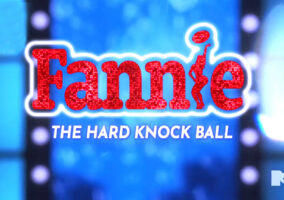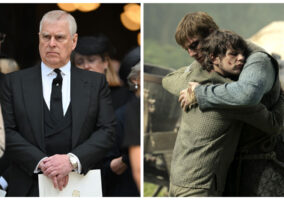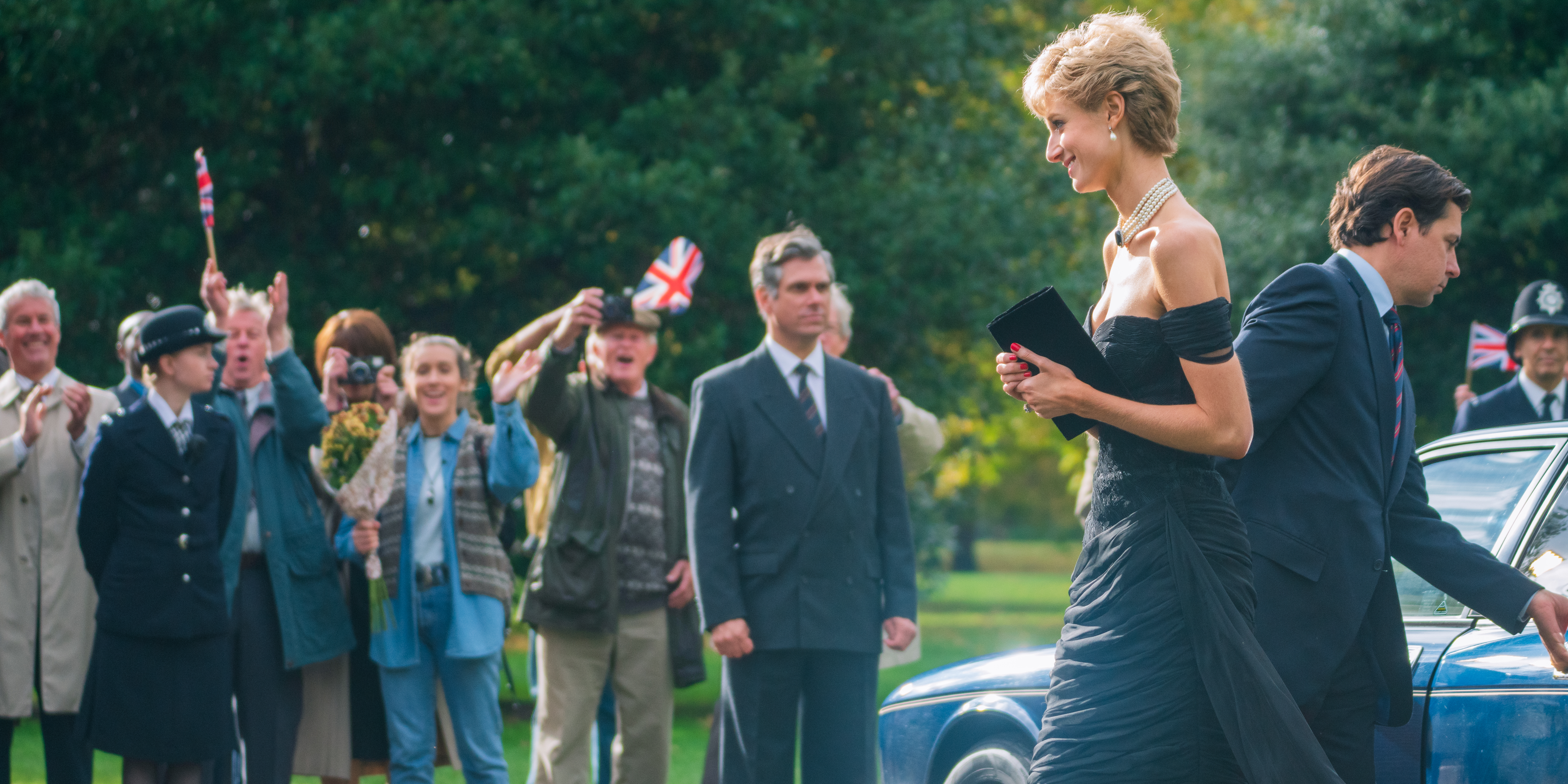
Episode 5: “The Way Ahead”
We open with Charles once again complaining. At a Christmas shooting weekend with extremely supportive friends in 1989, the Prince bemoans his lot in life, having to wait to become the most important man in the country with only his wealth to console him, “just a useless ornament, stuck in a waiting room, gathering dust,” he whines during dinner. His friends immediately implore him to recite the Wikipedia entry on The Prince’s Trust. And thus does Peter Morgan produce his perfect setup to talk about what could be considered one of the worst PR disasters of Charles’ life (with Diana’s death probably taking the Number One spot on that list): Tampongate. Hey, don’t get mad at us. We didn’t come up with that name. There was some confusion in the press as to whether this season would tackle the scandal at all, so we were surprised to see a full episode devoted to it. We were less surprised to see that the episode was also ostensibly about what a great, forward-thinking guy Charles is. For all the talk about how this show is disrespectful to its subjects, this episode came pretty close to hagiography, depicting Charles’ restlessness for the first time as progressivism rather than privileged petulance. Having finished whining, Charles retires to his room (we are struck once again of the royal oddness of having multiple museum-homes while also bouncing around other people’s vast homes throughout the social calendar, living a strangely rootless sort of life) to write a speech and rings up Camilla to get her advice on it. We are treated to a brief glimpse of family life in the Parker-Bowles home, which indicates a certain level of discomfort in everyone with the open status of Andrew and Camilla’s marriage. We talked in our podcast this week about some of the many storylines that get glossed over this season and we can add the Parker-Bowles marriage to the mix. Given the importance of Camilla not just in the historical record but in how her presence has spawned entire storylines and character arcs for several seasons now, it seems a little lacking to not spend a bit more time exploring whatever arrangements the Parker-Bowles had in their marriage and whether they were truly happy with them. For one thing, we don’t necessarily buy that Charles and Andrew were so cold and uncomfortable with each other. By all accounts, they were all part of the same cheery social circle. In a lot of ways, the Parker-Bowles marriage could’ve stood as one of the most successful high-profile polyamorous marriages on record, before the press got a hold of it and tore it apart. It would have been interesting and illuminating to see a little more of it; especially when it was working for them.
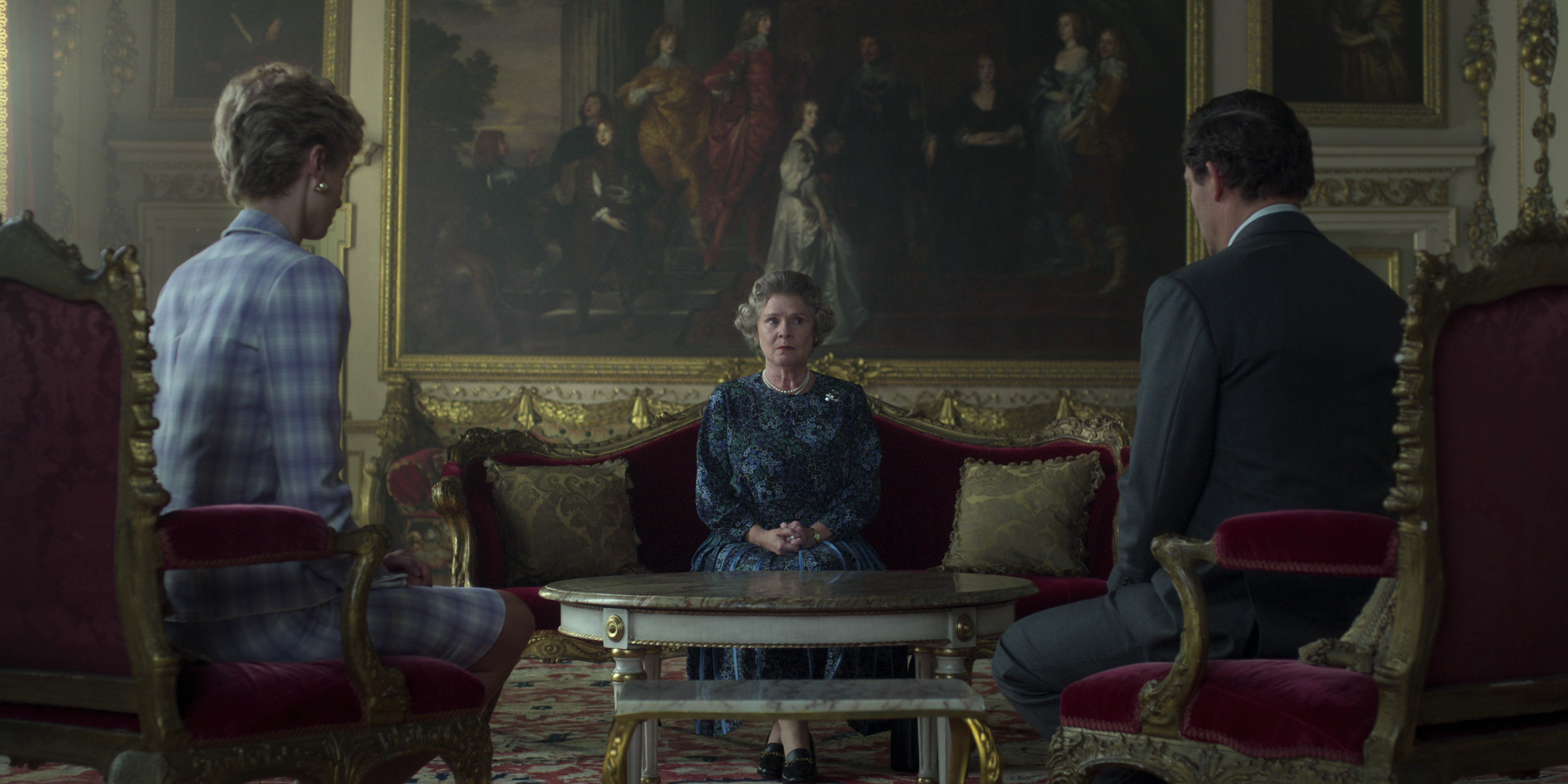
The conversation is “inadvertently” recorded and the tape is bought and shelved by a media still unwilling to cross certain lines in their royal coverage. Three years later, the Waleses meet with the Queen to agree (with some hesitation on Diana’s part still) to officially separate. After the mournful announcements are made by members of the government and church (helpfully underlining just how monumental the failure of this marriage was considered at the time), the Queen’s Council meets with courtiers and advisers to discuss a war-room response to all of the royal shit hitting the fan. In the meeting, Prince Philip takes charge and announces the “Way Ahead Group.” Charles scoffs at the cosmetic changes proposed in the meeting, criticizes the monarchy and argues for a much stronger, more radical response. To our surprise, Philip does not chase him out of the room with a sword. At dinner that night, the Queen notes that not only is Charles a changed man post-separation, but that she may have to admit that his progressive stances were right all along. This is a potentially seismic shift in how the family treats Charles, but alas, the press got in the way again. In some ways, the over-arching story of this season is about just how insane the royal press coverage got during that period as the old-school British press establishment gave way to a 24-hour news cycle. With the announcement of the separation, the decision is made to publish the transcripts of the phone conversation.
It’s interesting how the script doles out the infamous phone conversation throughout the episode, choosing only to show its un-scandalous aspects in the beginning and then flashing back to the more salacious parts as the scandal becomes front-page news. In a way, it feels very annotated; as if the show wants you to understand the dept of their bond before you get to the cringe-y parts of their conversation. As we noted in our podcast, the ironic thing about the Tampongate conversation is that it’s almost entirely innocent and the clear love they each have for the other is wildly on display. It also tended to underline the goofy aspect of their personalities, which became more obvious as time passed and hatred toward them cooled somewhat, but in the end it may have helped contribute to killing the idea that she was some sort of temptress and he was some sort of lothario. As Queen Anne put it in a rather charming scene as she visits a mopey Charles, after noting that the conversation was “a bit too gynecological for my tastes,” says that it was just “two teenagers of a certain age being so gloriously human and entirely in love.” The montage of the various family members reading the exchange in shock and disgust was well done, but we think we would have appreciated a few words from Diana at this moment, when the very thing that nearly destroyed her for over a decade hit the front page of the world. Instead of crying at the news, we’d have thought she’d felt some vindication.
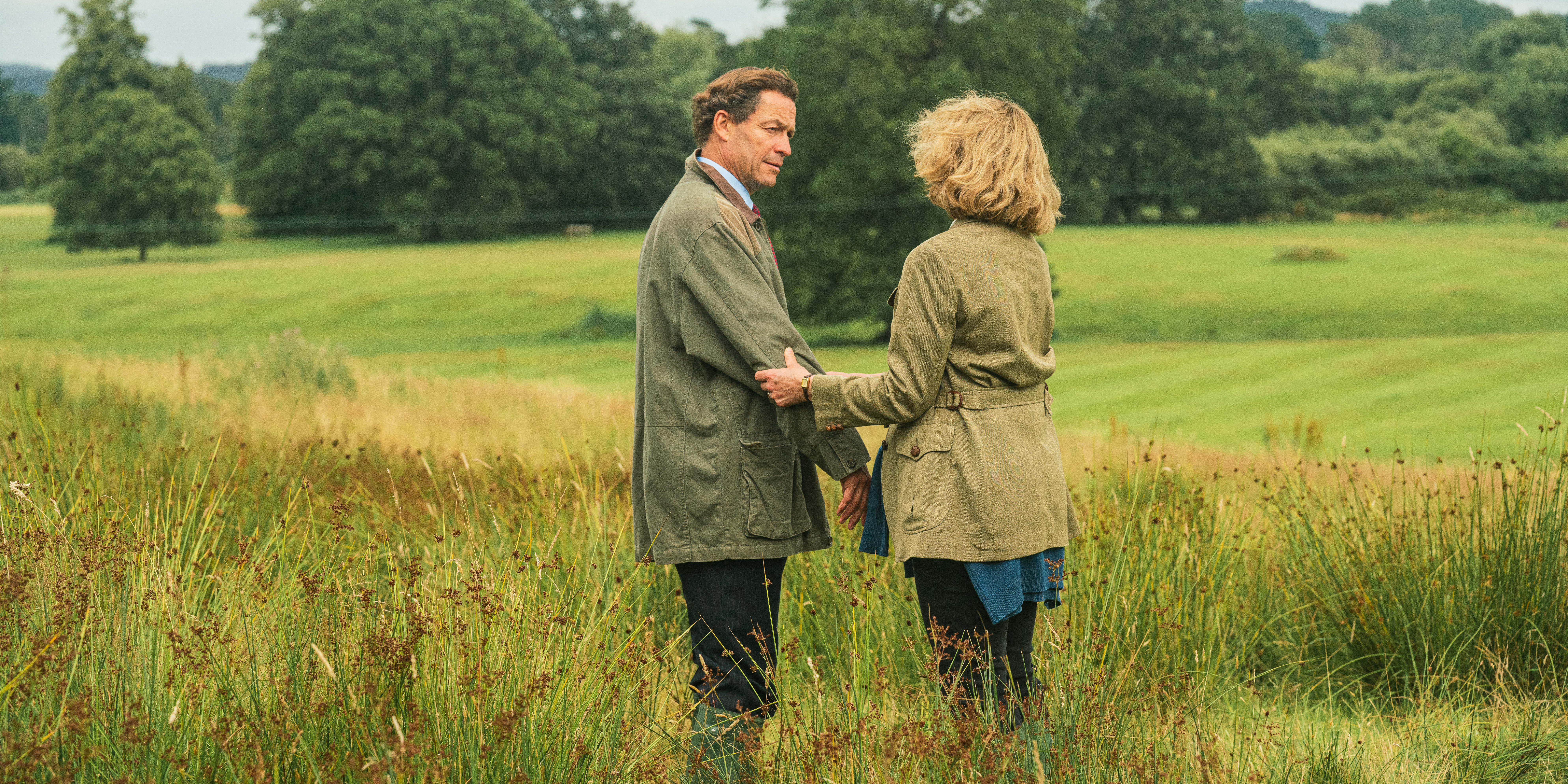
The next meeting of the Way Ahead Group does not go well for Charles. Philip absolutely tears into him and humiliates him by ordering him to leave. It’s really interesting watching another story about how the family considered Charles out of control and ill-suited to be King from the perspective of a world where he actually is King and, quite frankly, very little of the stuff they’re so upset about wound up mattering. This episode does a lot to play into that idea, positioning Charles as a flawed but decent man who was going to wind up saving the monarch from itself. It implies that so much of his parents’ opposition to Charles’ behavior was not as rooted in tradition and propriety as they liked to claim. That final scene of Elizabeth positively seething over the news that Charles had set up a rival court makes it clear that on some level, this is about power and who gets to hold it. To be fair, almost all of the conflicts on this show come down to that idea, from Margaret’s bitterness to Philip’s restlessness to Charles impatience and Diana’s petulance, it’s always been about the resentment that builds in people who live next to great power without being able to wield it themselves.
And speaking of wielding power, Charles agrees to a frank interview addressing the entire affair and Diana puts on one of the most famous dresses in history; each of them using their own royal power to protect and strengthen their positions. Camilla is the one person involved in all of this who has no real power and no ability to address the scandal. She finally moves out of her home under the watchful eye of the cameras at her front gate. John Majors meets with the Queen to report on the response to the Prince’s interview (having nothing else of import to do this entire season) and she’s not remotely pleased to hear that it has gone well for him. “It is not the monarch’s role to campaign or chase constituencies like a politician,” she says peevishly. Charles is, of course, not the monarch; a fact of which she likes to remind him every opportunity she gets. “One can end up undoing more than doing,” she warns Major. It’s a warning that clearly didn’t come true, which makes its presence in the script come off rather pointed. In short, the family and the Queen are presented as wrong in their criticism of Charles. “He’s not as weak as everyone thinks,” Anne reports to her parents, aunt and grandmother. “He knows one day he will be King Charles III,” she says. “And if we want to know what that will look and feel like, well he’s starting to show us.” For all the rather heavy prophesizing in this episode, the real reign of King Charles has not, so far, provided him an opportunity to breakdance, however.
Episode 6: “Ipatiev House”
We were pleasantly surprised by the opening scene of breakfast at Buckingham Palace in 1917, with King George V, Prince Edward, and Queen Mary. The show is leaning hard into its history this season, possibly as a contrast to the major overriding royal conflict of the 1990s: the clash between traditional and modern. The royal family is not shown in a particularly good light here, as their banal conversation and complaints about the war affecting the color of postage stamps are contrasted with scenes of life in London during wartime. Once again, Peter Morgan finds a way to critique the royals without touching Elizabeth herself. The Prime Minister sends a letter requesting the King’s approval to have the Tsar and Tsarina of Russia granted asylum in England after the Bolshevik revolution. The king seems annoyed by the intrusion and in over his head regarding the question and passes the letter to his wife. In Russia, the royal family is awakened by soldiers and asked to pack their things. They are joyous at the assumption that the Tsar’s cousin George has granted them refuge. These scenes are beautifully tense, sad, and ultimately brutal. We don’t think the show needed to cross cut to the King shooting pheasants on a hunt in order to drive home the point of his complacency, but the show tends to trade in sometimes facile comparisons.
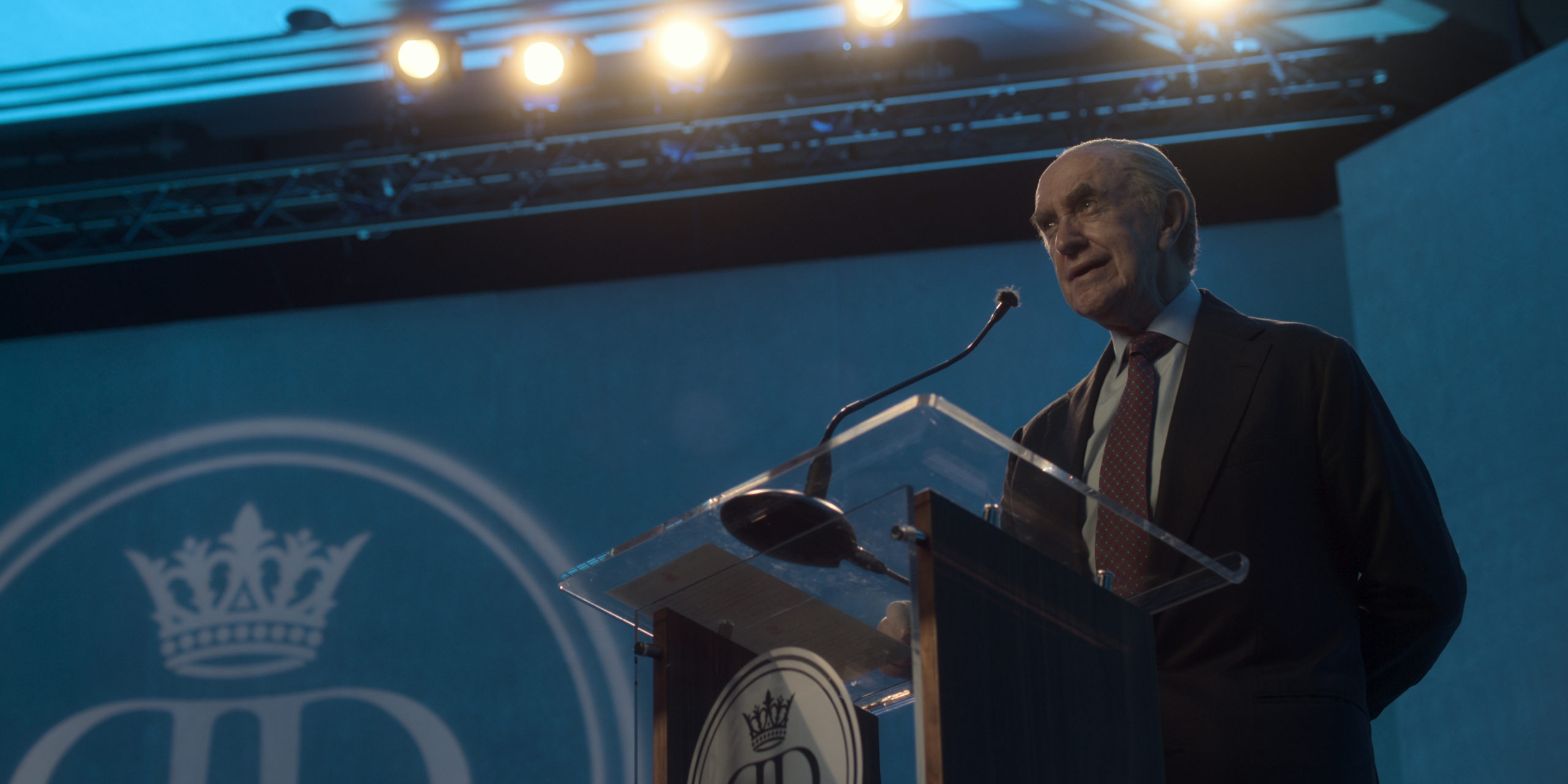
This opening bit of history is offered as prelude to the episode’s main storyline, the fall of the Soviet Union and the opening of diplomatic relations with the United Kingdom. This episode should have worked better for us, since it’s the only time this season that larger world events are even being mentioned, let alone commented upon. The focus on the family drama of the 1990s, which is admittedly huge and inescapable, has left this season of The Crown without its signature storyline: the interplay of government and sovereign as the Queen and her latest Prime Minister learn how to work together. The episode ultimately goes places we wish it hadn’t, but the opening scenes are pretty great. John Major advises the Queen on his meeting with Boris Yeltsin and his appraisal of the new government. Once again, Jonny Lee Miller comes off distractingly cute in a scene where we don’t think that was necessarily the intention. The Queen is delighted to hear that Yeltsin is an Anglophile and wants an invitation to Buckingham Palace. She excitedly relays this news to a frantically busy Philip, who’s preparing to leave for three weeks. Here’s where the show started to lose us, because it took the focus off the one world event of the season and reduced a lot of the storyline down to Windsor marital problems. Elizabeth is annoyed to see that he’s leaving and we don’t buy for one second that she would have had no idea of it until moments before he left. “Don’t you ever get tired,” she asks when he outlines his continent-hopping itinerary. “Only by sitting still,” he replies, adding somewhat harshly, “We’re different that way.” “More and more different,” she observes sadly.
Philip goes off on his jaunt with a supportive Penny Knatchbull among the entourage while Elizabeth stays home and prepares for Yeltsin’s visit. She is informed that he was responsible for having Ipatiev House, where her cousins were killed, torn down in the 1970s. Yeltsin arrives for his luncheon at the palace and he is crude and boorish in the way the show tends to treat the depiction of all world leaders. He invites the Queen to Moscow and to the old girl’s great credit, she put her own unfailingly genteel etiquette lessons and four decades of diplomatic training to use by very sweetly and politely informing the Russian leader that she is not happy to have heard his involvement of the destruction of her family’s final resting place and that there will be no royal visit to Moscow until their remains are properly interred. He promises to rectify the situation. In a scene that stretches credulity, he badmouths her crudely in Russian and in earshot of several dozen people. Later, John Majors meets with the Queen and looks very cute as he tells her that Yeltsin was good on his word and the horribly mangled and damaged bodies have been found and excavated, but that not all of them can be identified. At dinner that night, Elizabeth tells Philip that the Russians have requested a sample of his DNA, since he is the closest relative to the Tsarina and they need to identify the family through the maternal line.
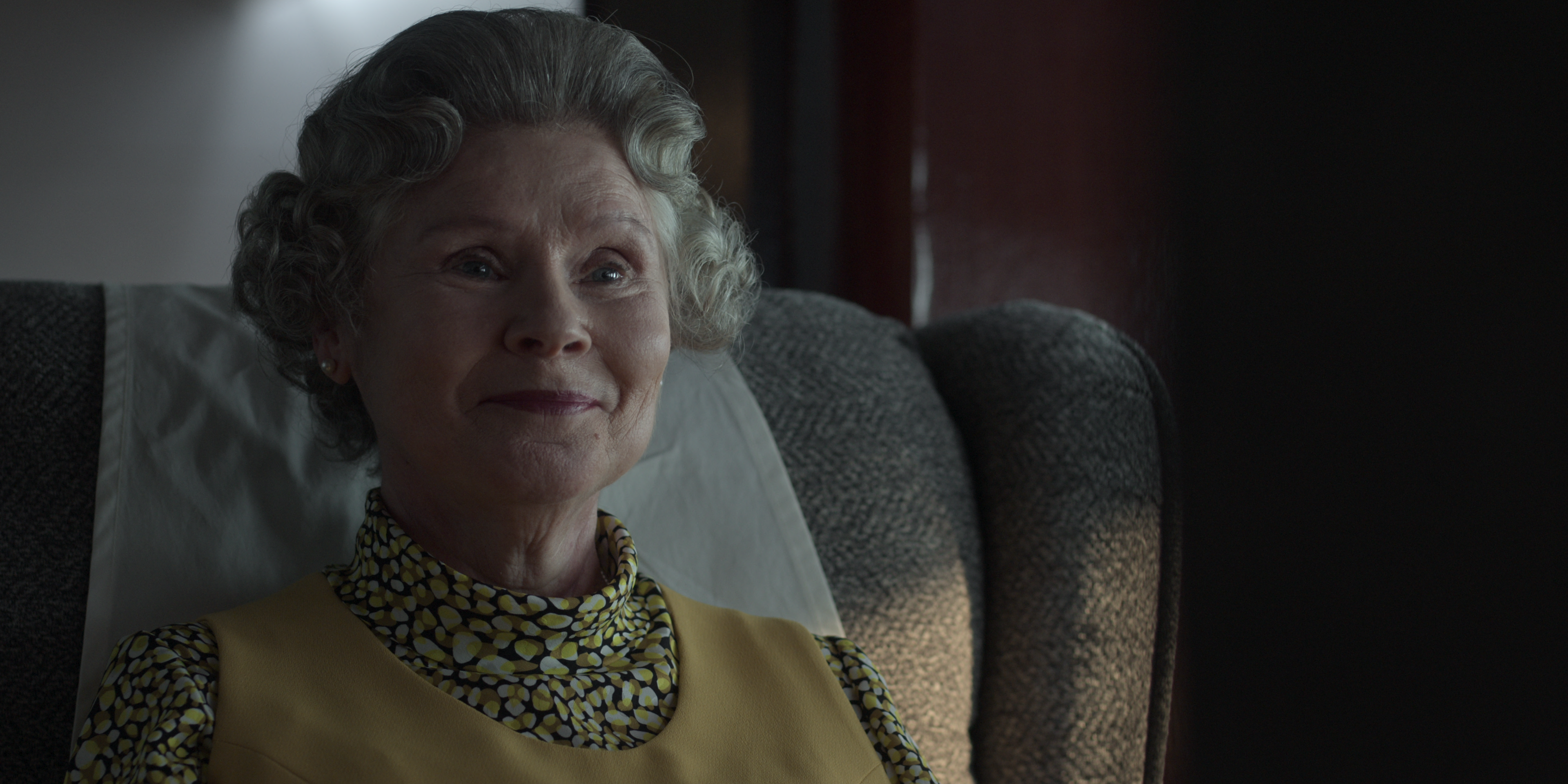
Once again, the show very subtly dances around the idea that the Knatchbull friendship could have/maybe/sort of been something else. When Philip arrives home, he sits for a moment in the car, looking lost in thought and somewhat chastened. At dinner, he is unusually brusque and cruel to Elizabeth, more or less calling her incurious and scoffing at her lack of knowledge. This is followed by a scene with Philip hanging out with his posse while a rapt Penny sits literally at his feet and marvels at the power of science and his own role in identifying the remains. There is a rather clear implication that Penny is providing the kind of intellectual support his own wife is unable to provide him. It’s a sort of “having its cake and eating it too” approach, because you really have to pay attention to see how the show is comparing the two women while maintaining clearly that there is no affair going on. Still, Elizabeth is thrilled by Philip’s newfound obsession with his rather tenuous Russian heritage and remarks that it feels like a way for them to reconnect after having grown apart. In Russia, they receive a royal welcome and Elizabeth, while while holding the Metaphor Hammer, gives a speech about how the strong family bond between Russia and England had grown strained and “warm ties of kinship frozen.” “There have been times,” she continues, waving the Hammer overhead, “where we have seemed to live in different worlds.” All of this strikes us the show’s most awkward attempt at tying world events to Windsor family drama, not least because it’s simply impossible to invest much energy into the idea that one of the most famously loyal and productive partnership marriages in history was in any sort of trouble. To be fair, we think the show is trying to present this period as just another down period in a long marriage’s cycle of ups and downs, but there’s more drama inserted into the idea than it truly warrants at this stage.
Having said that, we like when the show reminds us that Philip’s family background and his own sense of his ethnicity was markedly different from the Scots-German family into which he married. Regardless of whether this episode’s conflict rang true, it’s rooted in one of the few known minor tensions in the Windsor marriage. Elizabeth confronts Philip about how much time he’s spending apart from her on this trip and he responds that he’s been exploring “the grotesque injustices visited upon my relatives by your relatives.” He proceeds to list all of the things he had to give up when he married her, including his Orthodox faith. “After 47 years of marriage, we might ask yourselves how are we still alike?” he asks harshly. He tells her that her incurious and reticent nature has left him lonely. This all feels very out-of-left-field. Much like the return to the Peter Townsend story four decades after its resolution, this just feels like the show giving Jonathan Pryce something meaty because he’s Jonathan Pryce. As a piece of drama, it all feels very stale. He goes on to inform her that he has pursued an intellectual and spiritual companionship outside the marriage and names Penny specifically. “Couldn’t it have been a secretary?” she asks archly. He tells her it would be a mistake to ask him to end the relationship since he’s done nothing wrong and requests that she be seen with Penny more often, so as to give the friendship her public stamp of approval. This entire storyline is based off of tabloid headlines and leaves no room for the likelihood that both Philip and the Queen saw Penny as akin to a niece and that the reason the Queen was seen in public with her isn’t because she had to be convinced to. It just feels very clumsy and it’s hard to get invested in any of it.
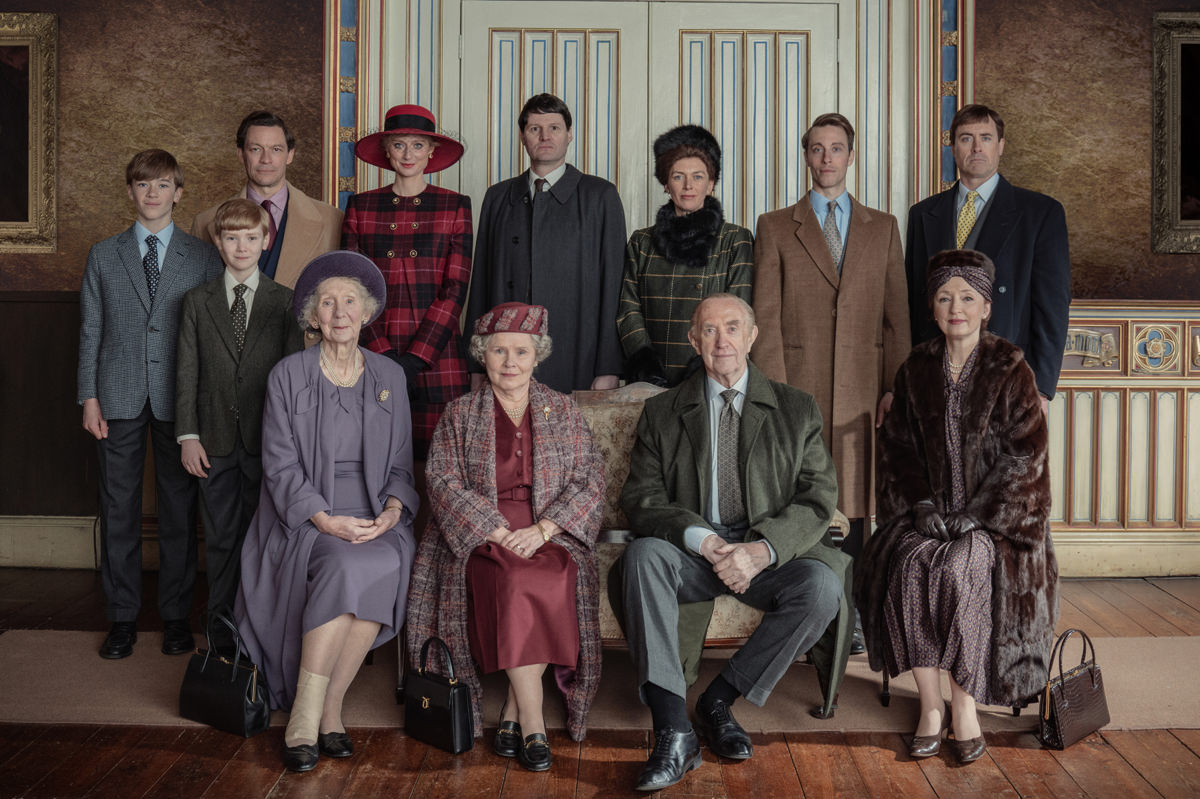
The Queen invites Penny to Windsor castle and fusses with her hair in a mirror as if she were meeting her husband’s mistress instead of an extended family member she’s known for years. She is quite cold with the nervous Penny, and asks her about her theory regarding the Romanovs. Penny goes on to tell her that her grandparents could have granted them asylum but refused, which Elizabeth is at first treats with disbelief. Penny goes on to suggest that Queen Mary denied the request because she had a longstanding rivalry with the Tsarina, who turned down George V before he proposed to her, making her his second choice. Elizabeth immediately shuts down the theory by informing her that Mary refused the request because of the Tsarina’s German sympathies at a time of war and that she did so with great regret, in service to protecting the monarchy. Even if we think this storyline is poorly executed and not particularly believable, it allowed the show to return to one of its main themes: there is a specific knowledge and perspective that comes with being a sovereign that only a sovereign understands. The Queen has herself a good cry and Penny is invited to walk with the family to church on Christmas morning at Sandringham, the ultimate show of support and insider family status. At her meeting with the prime minister, Elizabeth picks up the Metaphor Hammer and smashes a few tables and chairs while saying that any frosty relations with Russia “are a blip in an otherwise long and happy marriage.”
Friday Leftovers for the Week of November 6th, 2022 Next Post:
Taylor Swift in David Koma at the 2022 MTV Europe Music Awards
Please review our Community Guidelines before posting a comment. Thank you!

